- Home
- Brian Garfield
Death Sentence Page 7
Death Sentence Read online
Page 7
“I keep wondering if it isn’t one of our esteemed mayor’s crazy stunts.”
“What’s that?”
“The vigilante,” she said. “It could be a cop, you know.”
“I suppose it could be.”
“Or the whole thing might be a phony. Suppose it’s something they’ve cooked up in the crime lab? The victims could have been shot by eleven different guns, for all we know—we’ve only got the crime lab’s word for it that there are only two guns involved. Suppose every time they find a dead man with a criminal record, they pin it on the vigilante?”
“Why would they do that?”
“Mastro was in court today to testify in a case. He told me—”
“Who?”
“Vic Mastro. He’s a police captain, they’ve put him in charge of the vigilante case.”
“Oh that’s right,” he said vaguely. “I knew I’d seen the name somewhere.”
“Mastro said something interesting. You know cops, they’ve got an interstate grapevine like everybody else. He’s got a friend on the force in New York. They’re still blaming murders on the vigilante there.”
“Yes, I know. They haven’t caught him yet.”
“He’s been blamed for three killings in the past two weeks in Manhattan. Mastro thinks they’re phonies. All three were shot by different guns. But the police are keeping the vigilante alive.”
“You mean he’s dead?”
“Nobody knows. But as long as the vigilante gets publicity, the crime rate stays down.”
“Is it really down? There was a lot of debate about that when I was still in New York. The police and the mayor’s office denied there’d been much change.”
“They had to. Otherwise they’d be admitting the vigilante was accomplishing what their own police department couldn’t accomplish. The fact is, street crimes were off almost fifty percent for a while. They’ve started to climb again, but it’s still far below the record rate. Mastro insists they’re keeping the vigilante myth going for that reason.”
Paul reached for the scotch when the waitress took it off her tray. “What’s happened to the crime rate here in Chicago?”
“Down about twenty percent in the past few days.”
“Well it might be a policeman,” he said. “Or a small secret group of policemen.” He lit her cigarette for her; he’d taken to carrying matches with him. “Let’s talk about something a little less grim.”
She smiled. “I’m sorry. I’ve gotten too used to taking my work home with me. What time is the party?”
“Seven. You sure you want to go?”
“It’ll be a change from the faces I see around the courtroom.”
“They’re probably crashing bores.”
“We can always leave early.”
The car had been manufactured before the introduction of interlocks or seat-belt buzzers and she perched next to him on the middle of the seat. He was pleased and he was alarmed. There was too much conflict in his reactions to her. He had contrived to cement the acquaintance because he needed to know more than the newspapers could tell him about the official hunt for the vigilante: every item of knowledge would help him stay ahead of them. Now that he knew she was on good terms with Mastro he knew he had to go on cultivating her. At the same time he liked her and that was dangerous because he could not afford ever to relax with her.
He waited in the living room of her apartment while she changed behind the bedroom’s closed door; he sipped a drink and read about himself in the Tribune.
“That’s lovely,” he said when she appeared. Pleased, she pirouetted for him; Paul laughed at her. At the awning on the sidewalk he opened the umbrella and convoyed her to the car under it; then they were driving north in a crawling tangle of half-blind cars, wipers batting the snow.
“You’re a very careful driver.”
“I lived all my life in New York. This is the first car I’ve ever owned. I’ve had a license since I was eighteen but I’ve never particularly enjoyed driving.”
“Maybe that’s why you’re still alive.”
He had to counter the impulse to look sharply at her. She’d said it cheerfully enough; she meant nothing by it. But her eyes in repose had something near a mischievous expression and at times he had the odd feeling she was amused by him: the feeling that she could see his every thought. It was a fantasy but it unnerved him; she was a clever woman and that implied peril.
She fumbled a cigarette from her bag and dropped it and Paul nearly panicked when she began to feel around on the floor for it. Suppose her hand touched the .38 that was clipped to the springs under the seat?
She found the cigarette and punched the dashboard lighter.
“I’m not sure whether that thing works.”
“We’ll find out soon enough.”
The lighter clicked and she put the red end to her cigarette. “For shame. You didn’t test it before you bought the car?”
“I kicked the tires. Isn’t that enough?” Get a grip on yourself.
Childress lived on Clark Square in Evanston. The square was a park that fronted on the lake; three sides were faced by stately old houses and big trees heavy with snow arched over the street. It had a kind of decaying dignity like parts of Riverdale he’d seen.
They picked their way under the umbrella, skirting drifts and puddles. In front of the house a small car was parked. “That’s Childress’s car. Spalter told me about it.”
“He does have a sense of humor, doesn’t he.”
The bumper sticker was large and bright-hued: “Be American—Buy American.” The car was a Datsun.
The lawns were the sort that in the spring would bloom with azaleas and rhododendrons. You’d probably see children riding their bikes along the shaded sidewalks. Northwestern University was close by; doubtless some of the deans lived here; it was an odd neighborhood for an executive like Childress who routinely was described by flacks as “towering” but Spalter had explained that Childress had been born and raised in the house and had never entertained thoughts of moving to a more expensive area. Paul wondered how it would feel to live with his roots as solidly implanted as that; he had spent his own life adrift from apartment to apartment, driven from neighborhood to neighborhood by the constant shifts in New York’s ethnic and economic boundaries. He couldn’t remember having had anything like a home in the apple-pie Hollywood sense. It wasn’t a lack for which he’d ever pitied himself but at times he was curious about it and the old-glove comfort of Childress’s Victorian house brought the feeling to the surface.
It was a center-hall house with matter-of-fact staircase and carpeting that had seen wear. A maid admitted them: she wore an aproned uniform that put him in mind of old movies. Gusts of laughter and talk came along the hall. Paul noticed the windowpanes were striped with electronic alarm tape.
Childress and Spalter appeared behind a woman in the far doorway; the three of them advanced smiling and there was a round of introductions and handshakes. The woman proved to be Childress’s wife. She was a middle-aged club-woman, inclined to fat, grimly corseted; Paul had a glimmer of the motivation behind Childress’s disapproval of corporate wives.
Childress’s red round face smelled of expensive aftershave. He was very happy to meet Miss Evans. “Come and meet the rest of my sycophants.” Childress’s humor had bite; it was his defense against whatever demons he had.
“You know Jim Spalter, of course. He lives around the corner, now, fourteen blocks from his house—community property, you know.”
The drawing room was larger than the exterior of the house had suggested. Against its defiantly staid musty furnishings there were vaguely erotic paintings and gay Japanese-style lights suspended at random levels from the ceiling; Paul was sure Childress had done it all with a straight face. As they entered the room Childress was buttonholed by a compatriot and waved them toward the bar as he turned his back; Irene said to Spalter, “My God, it he always like this?”
“You should see him at co
nvention luncheons. You’ve never seen such an earnestly broad-minded prude. Anxious as hell to have everybody know he’s a regular fellow.”
“And sneering at them all the time out of the side of his mouth.”
“That’s the cross a genius bears.”
She said to Paul, “You’re going to have fun, if you don’t cave in.” She was twinkling.
“It’s a new and different experience,” he agreed drily. “I’ve never worked for a madman before.”
Spalter said, “What’ll you have?”
“A hangover, I expect,” Irene said, “but I’ll risk a bourbon and soda.”
“Paul?”
“Scotch and water, thanks.”
Spalter turned his back and pried his way to the bar.
An old man whose neck bulged with loose folds of fat came through the crowd beaming. He wore a grey striped suit, the baggy pants of which were cinched high around his chest like a mail sack. “Irene for Christ’s sake.”
“Harry—dear Harry, it’s been so long. Paul, this is Harry Chisum. He’s responsible for the abysmal breed of lawyers Northwestern turns out every year.”
“Not any longer, dear. Professor emeritus since September.”
“Oh Harry, no! They can’t put you out to pasture.”
“But they have.”
“Harry was my mentor,” she explained to Paul. “Major professor, goad and confessor.”
Paul said he was happy to meet Professor Chisum and the old man shook his hand warmly. “Imagine a pupil of mine descending to the primeval slime of a Childress orgy. My dear I’m dismayed.”
“And what are you doing here then?”
“Ah, I’m a perverted old lecher, didn’t you know? A closet degenerate.” He leered toward an enormous oil canvas of sated nymphs. “They sold those under the counter during the Italian Renaissance. Actually John Childress was one of my first students, you know. And still one of the best, although no one remembers he was a lawyer before he turned his talents to the machinations of commercial accounting. The best—which is to say the most evil—businessmen are lawyers.”
“And the worst lawyers are businessmen.”
“It’s not fair to throw an old man’s words back at him. You’ve altogether too good a memory.”
Spalter arrived balancing the drinks, distributed them and hovered. Irene said, “I can’t imagine you playing shuffleboard. What are you doing with yourself?”
“What do retired intellectuals do? They stay out of mischief by writing books.”
“Is it a secret?”
“Not from you. In any case it’s the same book everyone’s writing nowadays. I hope to offer a thing or two the others can’t match. It’s on crime.”
“I’m dying to read it, Harry.”
“I’d be delighted to have you pick holes in the manuscript. When it’s completed.”
“You know I’d be honored.”
Spalter said, “I hope you’ve got some solutions for us, Harry. We’ve had enough experts expounding on what the problem is.”
“I’m hoping that’s the little difference that will single out my modest tome. It’s not a book of questions. It’s a book of answers.”
Irene smiled her slow smile. “Harry, you can’t just let that one lie on the floor like a piece of raw meat.”
The old man was delighted. “You’ll just have to wait and read the book, won’t you.” He nudged Paul. “I’ve got a sure sale already, you see?”
“Harry,” she said firmly.
Paul said, “If you’ve got real solutions to the—”
“Answers, I said. Not solutions. A solution is that which provides actual resolve of a problem. An answer, on the other hand, may be mere theory or hypothesis.”
“You’re still wriggling, Harry.”
“The distinction is valid, my dear. My book can do no more than offer recommendations. They are recommendations which I’m certain the politicians and the public will find unacceptable if not repellent. They won’t solve the problem, because they’ll never be put into practice.”
“My goodness. You sound as if you’re going to propound something Hitlerian.”
“Perhaps it is—if only to the extent that anything smacking remotely of authoritarianism is equated these days with Hitler.”
“You can’t kid us,” Spalter joked, “we all know you’re the vigilante, Harry.”
Paul tried not to stiffen.
“That’s Harry’s secret solution,” Spalter confined to Paul. “The Final Solution.”
“Vigilantism solves no problems,” Chisum said.
“Well it seems to be doing a pretty snazzy job with our crime rate right now, you’ve got to admit that,” Spalter said.
Irene laughed in her throat. “I’m sorry. I’m just visualizing Harry skulking in a slum alley with two guns in his holsters. ‘Draw, you varmint.’”
Paul managed a weak smile.
Spalter said, “I’ll tell you one thing. Real or phony, this vigilante has stirred up the public consciousness like nothing you’d believe. Nobody talks about anything else. He’s got a lot of sympathy out there. You talk to people around town, you begin to realize their feelings about things. Right or wrong, this vigilante is making people feel there’s some kind of justice in the streets for the first time in memory. God knows it’s a sudden justice, but all the same it’s—”
“It’s not justice,” the old law professor snapped. “Whoever these vigilantes are, they’ve gone far beyond justice. They don’t want justice. They want blood.”
“They?” Irene said.
Spalter said, “It can hardly be the work of one man. Not all of it. New York and Chicago at the same time?”
Paul spoke, because it would have been strange if he hadn’t. “You’re suggesting he’s—they’ve—got a thirst for blood. A hunger for violence and killing. I don’t think that answers it, not completely.”
Irene said, “I think Paul has a point. Revenge is a very personal thing, while justice is a social thing. But the vigilante—he or they, whatever it is—the vigilante has made a public issue of it. Deliberately. These murders are a public-relations campaign, in a way, and whoever’s doing it wants to make it far more than just a private vendetta. He’s trying to arouse the entire citizenry. He’s trying to focus public concern on a crisis, and if you ask me he’s doing a bloody brilliant job of it. No, I can’t agree at all that it’s pure blood sport or private vengeance.”
Chisum shook his head; the folds of wattled flesh shook beneath his chin. “These men, the vigilantes, they’re trying to act out their own personal fantasies of an ancient myth. The vigilante sees himself as some kind of reincarnation of the traditional American hero. I’m sure of that. He’s got an image of himself as a messianic reformer, trying to resurrect the kind of heroism that forged our national identity in the Wild West. The frontiersmen who killed and got killed until the wilderness was mastered. But it was a false image then and it’s false now. It wasn’t the gunslingers who tamed the country. It was the settlers. In the same way, it can’t be the vigilantes who’ll solve anything today. They only add fuel to the flames.”
The old man was at home with an audience. Other conversations around them had dwindled; people were turning to listen to him; Chisum’s enthusiasms waxed visibly. His gestures grew larger. “These vigilantes may think they’re doing something for society, but they’re only acting out their own pathetic fantasies. Look. If there’s a heavy snowstorm and a big building collapses, it’s no good blaming the blizzard. You’ve got to go after the architect who designed the building. You’ve got to try and persuade him to change his architectural system.
“That’s our problem. The architects are immobilized by outdated archaic traditions—the millions of laws on the books. And too many architects have been corrupted, they cut corners with cheap building materials and substandard construction standards. That’s the plea-bargaining system, the cops and judges who sell themselves as casually as street-walking whores.
“And the public? The public is the buyers and renters of the building. They don’t want to see enough money spent to insure a sound structure. They’d rather cut corners and take a chance there won’t be a blizzard.”
Spalter said, “You can’t really say the public doesn’t give a damn. What about this hue and cry about crime?”
“People are concerned that the building might collapse. But they don’t act on that concern. The most widespread disease in this country is the sense of personal powerlessness. Impotence. It breeds apathy, and apathy breeds the violence of crime and vigilantism. The more powerless people become, the more violent they become—revolutionaries are always the powerless people.”
“These criminals and vigilantes,” Paul said. “Are they revolutionaries?”
“I think their motives are the same, essentially. They’re disaffected by their powerlessness and they’re seduced by violence because it’s the only way they can express anger with their frustration and impotence.”
Paul saw John Childress nearby. Childress was smiling. “Harry, take a bow. You’re doing a spectacular job of belaboring the obvious.”
Chisum regarded his host with arch good-humored contempt. “The obvious becomes less obvious, John, when you consider the fact that we’re completely stymied by two opposing forces—and that both of them come from exactly the same political source. One: the obsession with bringing in the government to correct every last flaw in the human condition. Obviously that makes the government more and more powerful, and the citizens less and less powerful. Two: the pathological fear of a possible misuse of power. The checks and balances.
“You see?” he demanded. “First we create a government with ever increasing power. Then we spend every waking hour finding ways to prevent that power from being used against us. It’s total stalemate.”
“Nothing can happen from the top, you mean,” Spalter said.
“Right now it’s only happening from the bottom, isn’t it. Crime—and vigilantism.”
“Then what’s the answer?”
Chisum waved his age-spotted hands as if parting waves in a bathtub: deprecating, dismissing, minimizing. “The answer is the old human answer which we’re too sophisticated to believe. Common sense. The democratic simple-minded fundament: the greatest good for the greatest number.”

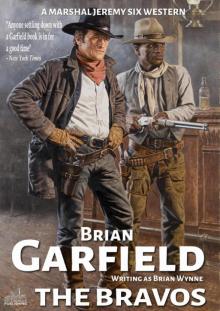 Marshal Jeremy Six #3
Marshal Jeremy Six #3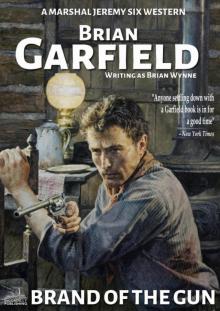 Marshal Jeremy Six #6
Marshal Jeremy Six #6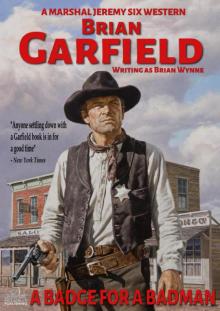 Marshal Jeremy Six #5
Marshal Jeremy Six #5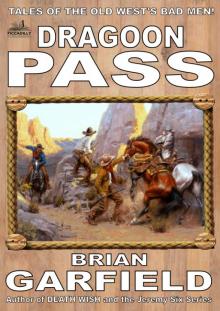 The Outlaws 2
The Outlaws 2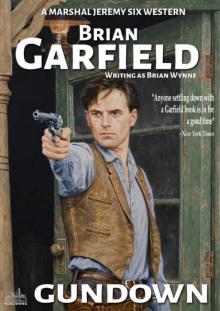 Marshal Jeremy Six #7
Marshal Jeremy Six #7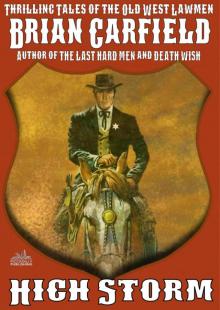 The Lawbringers 4
The Lawbringers 4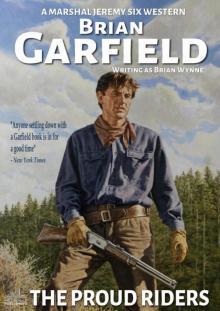 Marshal Jeremy Six #4 the Proud Riders
Marshal Jeremy Six #4 the Proud Riders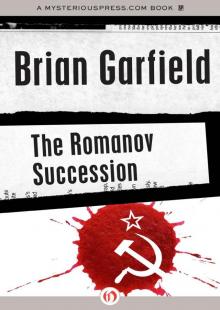 The Romanov succession
The Romanov succession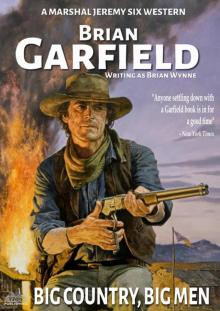 Marshal Jeremy Six #8
Marshal Jeremy Six #8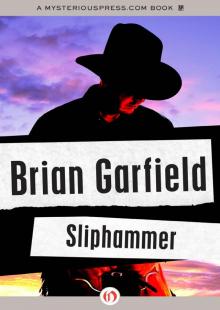 Sliphammer
Sliphammer Line of Succession
Line of Succession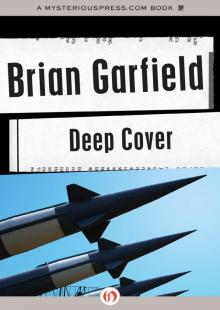 Deep Cover
Deep Cover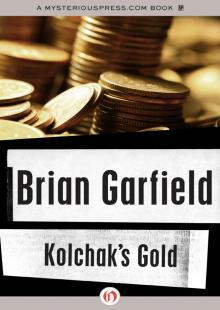 Kolchak's Gold
Kolchak's Gold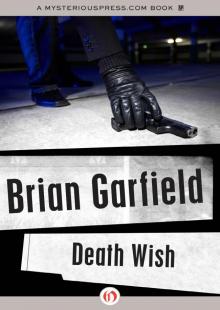 Death Wish
Death Wish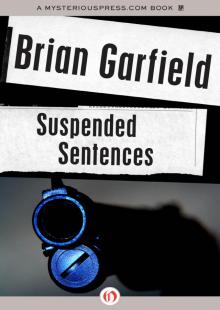 Suspended Sentences
Suspended Sentences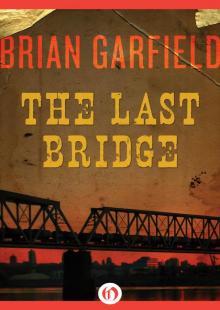 The Last Bridge
The Last Bridge Relentless
Relentless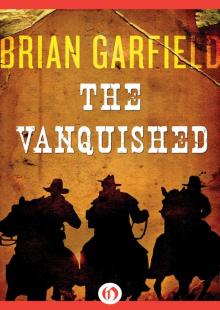 The Vanquished
The Vanquished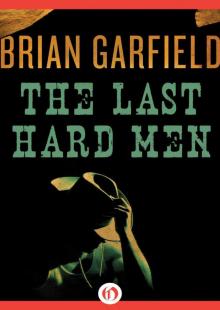 The Last Hard Men
The Last Hard Men Hit and The Marksman
Hit and The Marksman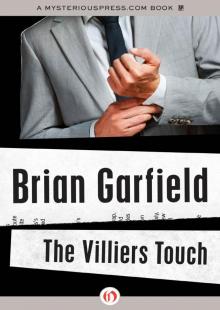 Villiers Touch
Villiers Touch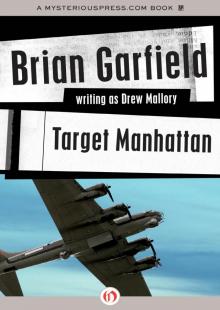 Target Manhattan
Target Manhattan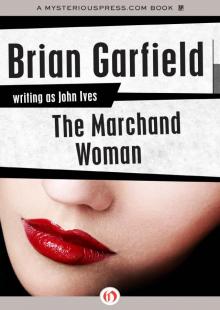 Marchand Woman
Marchand Woman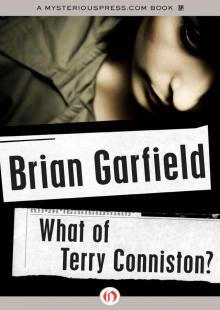 What of Terry Conniston?
What of Terry Conniston?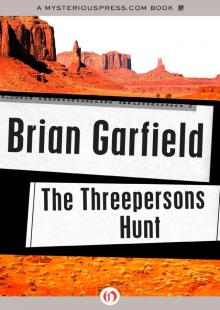 Threepersons Hunt
Threepersons Hunt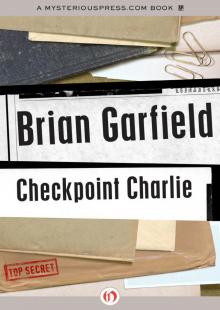 Checkpoint Charlie
Checkpoint Charlie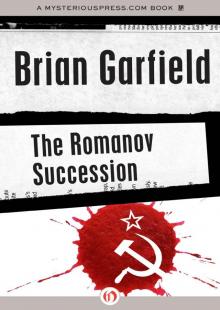 Romanov Succession
Romanov Succession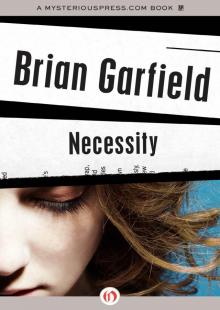 Necessity
Necessity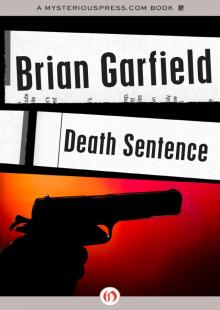 Death Sentence
Death Sentence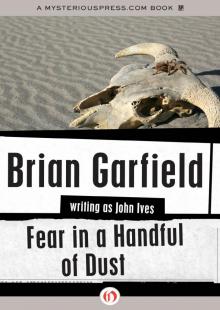 Fear in a Handful of Dust
Fear in a Handful of Dust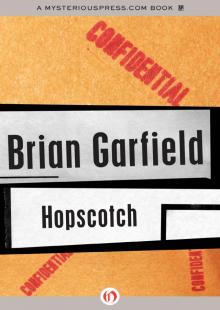 Hopscotch
Hopscotch